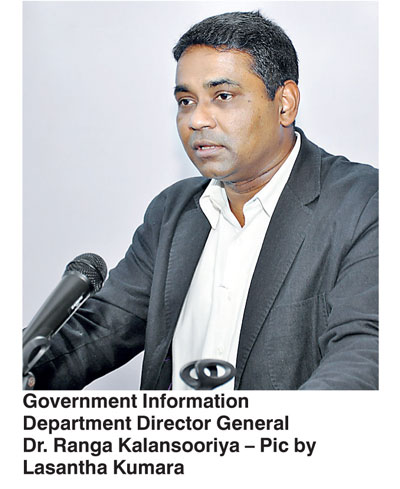Tuesday Feb 17, 2026
Tuesday Feb 17, 2026
Friday, 9 December 2016 00:01 - - {{hitsCtrl.values.hits}}
 Government Information Director General Ranga Kalansooriya on Wednesday called into question the media’s decades’ long practice of “selling negativity” which he said are at odds with the inherently positive nature of development reporting.
Government Information Director General Ranga Kalansooriya on Wednesday called into question the media’s decades’ long practice of “selling negativity” which he said are at odds with the inherently positive nature of development reporting.
“‘Bad news is good news’ is a motto in any newsroom. Negativity is easy to sell. Media is ultimately a business, no matter how much people wax eloquent about the virtues of a fourth estate. The market value is in negativity. Development journalism clashes with this negativity,” he said, speaking at a workshop on poverty and development reporting organised by the Centre for Poverty Analysis (CEPA).
Development journalism has long been used as propaganda for the sitting Government, said Kalansooriya, and media institutions are faced with a conundrum when they are required to report positive stories that aren’t necessarily front-page material.
“A lot of journalism institutes no longer teach development journalism. It has been converted to constructive journalism - in other words, to think positively. But are our newsrooms positive? Can you sell a positive story? Can you sell RTI? No, it’s not a marketable story. RTI stories don’t make it to page 1,” he said.
Alluding to the proposed constitutional amendments and the reporting thereof, Kalansooriya said that if there were clauses that went against Buddhists interests, the headlines will make it to page 1; but if that was not the case, the story would likely appear on page 5.
“As long as a boogeyman can be created, it’ll make it to page 1. After the constitutional committee report came, was there a single report in our weeklies? The committee summary was not analysed in any paper. But a lot of papers carried stories about the monk in the east,” he said.
Kalansooriya also hinted of reports received by him of some journalists receiving bribes of up to Rs. 10,000 for reporting about the controversial Buddhist monk.
The Yahapalana Government has been criticised by some supporters of its inability to communicate its message to the masses. Commenting on this, Kalansooriya acknowledged that there is some truth to the complaint.
“I too am deeply embedded in this topic [of poverty and development reporting]. The Government is concerned that the good work they did doesn’t get communicated to the people. There is some truth to this. The reason for this, as I see it, is that this Government is clinging to good governance policies,” he said.
“For example, the information department gets a massive budget allocation. This wasn’t done by this Government. It happened between 2006 and 2014. How this money was managed is now under five separate investigations. Some of it has been spent on Government propaganda. This Government doesn’t have that machinery. All of that weight has been placed on me,” he added.
The State media, said Kalansooriya, is State in name only, compelled to depend on ratings and advertising revenue.
“There have been over Rs. 200 million in losses at Rupavahini and ITN. The treasury doesn’t give money to the so-called State media. They need to compete for ratings. They need to pay salaries and bonuses. It’s called state Sedia only because the Government makes the appointments. Every second in airtime counts. All broadcast media in Sri Lanka are running at a loss. So how can they communicate the Government’s development story?” said Kalansooriya.
Last week the Government issued a public notice on media standards and regulations, seeking public opinion pertaining to matters of media ethics. According to Kalansooriya, a respected journalist on his own right, a broadcast authority is also on the cards.
“Who sets the agenda of a private media organisation? We’re not journalists, we’re media hires. Is development journalism and poverty alleviation relevant to the media owner? It might be, but that’s only if it helps promote their brand. The Government has a responsibility to untangle this mess. The first step in intervening was the first concept note (on which public opinion will be sought till 31 December),” he said.
“We’re groping in the dark. The system needs to be fixed. We have to build a base that reports to the public. A broadcast authority must be established. That is the next step. Media laws and policies are the responsibility of the Government,” he added.